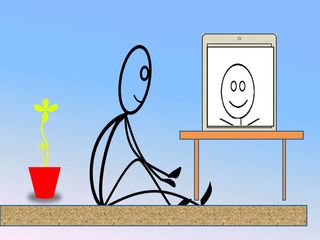Online Therapy
Teletherapy Can Help When Social Distancing Prevails
Video sessions can bring perspective to psychological stresses.
Posted April 10, 2020
The streets are empty except for walkers, who are careful to keep over six feet apart. The offices are mostly closed. Even the nearby tennis courts have suddenly become off-limits.
But communication between people can survive social distancing, better called physical distancing since other forms of communication are available. Psychotherapy via telehealth is a good example.
We remember Freud as a pioneer of psychotherapy who had patients discuss their dreams while they reclined on a couch. A reason he did so, less widely known, was to avoid the distraction of doctor and patient looking at each other in the eye. Nowadays, most of us see clients face-to-face, but when office visits are prevented by the virus, a reasonable substitute can be offered by video sessions, with the advantage of not traveling to an office. Cell phone sessions may also be possible, depending on insurance and providers.

Fortunately there are clinical psychologists, psychiatrists, social workers, and licensed professional counselors trained to keep sessions confidential and to help people function better via telehealth services.
In his article “Why Talking About Our Problems Helps so Much (and How to Do It)”, Eric Ravenscraft in the April 3 New York Times described how highly charged emotions and thoughts can benefit when they are put into words with a tuned-in listener.
"When you are feeling very intense feelings—especially fear, aggression, or anxiety—your amygdala is running the show," he wrote. "Research from UCLA suggests that putting your feelings into words—a process called 'affect labeling'—can diminish the response of the amygdala when you encounter things that are upsetting…. Research from Southern Methodist University suggested that writing about traumatic experiences or undergoing talk therapy had a positive impact on a patient's health and immune system. The study argues that holding back thoughts and emotions is stressful. You have the negative feelings either way, but you have to work to repress them. That can tax the brain and body, making you more susceptible to getting sick or just feeling awful."
Although there is more to it than that, and many psychotherapists use more specialized methods like cognitive behavioral therapy when appropriate, these are some explanations of how bothersome things can feel less stressful.
To be sure, video calling can bring distractions, like seeing yourself on the screen along with the person you're talking to. There is also keeping your device charged, not being interrupted by housemates or children, and being decently dressed while at home. But usually, these can be managed with a little practice.
You may have seen lists of recommended activities to help with the stresses of social distancing, like taking walks every day, especially in a natural, green setting if you can, communicating with friends and family, regular routines for exercise, meals, and sleep, slow and controlled breathing, contracting and relaxing one muscle group at a time, teleworking if you can, starting new projects, and giving to others.
But when anxiety, depressed mood, anger, or other uncomfortable feelings are too much, telehealth therapy might help. You can check to see which local mental health providers are in-network with your insurance in your state, looking for who is licensed or professionally supervised.
Otherwise, you may find low-fee, licensed psychotherapists who offer telehealth sessions, cell phone apps for sleep problems and mental relaxation, and hotlines or community mental health centers, especially for emergencies.
It may help to think of so many others who are in the same situation or worse and to do what you can for your own and others' well-being. People had problems before, but this crisis has brought additional causes of stress for many. Teletherapy offers one possible tool for better coping.
(c) 2020 Robert A. Lavine, Ph.D. All rights reserved.
Check Psychology Today's directory of therapists for a professional providing teletherapy near you.


